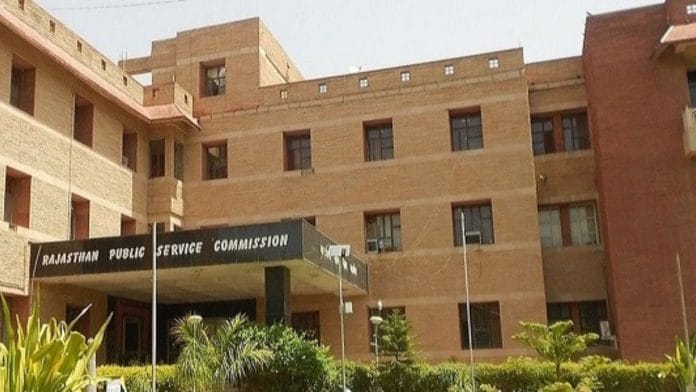New Delhi: In its judgment cancelling the 2021 recruitment exam for the posts of sub-inspectors in Rajasthan Police, the state high court has pulled up the exam-conducting body, Rajasthan Public Service Commission (RPSC), for widespread malpractices and the involvement of its members in the compromise of the sanctity of the exam process.
In a judgment passed last week, the Rajasthan High Court named former RPSC members Babu Lal Katara, Ramu Ram Raika, Manju Sharma, Sangeeta Arya, and Jaswant Rathi, as well as the former RPSC chairman Sanjay Shrotriya, for enabling the systemic and large-scale compromise. Days later, on Monday, Sharma, the wife of poet and former Aam Admi Party (AAP) leader Kumar Vishwas, tendered her resignation as RPSC member, citing damage to her prestige and the commission’s dignity.
The judgment was delivered while disposing of a clutch of petitions filed seeking cancellation of the recruitment exam conducted by the RPSC in September 2021 for 859 posts. However, the exam, scheduled to take place between 13 September and 15 September 2021, was marred from the first day, at the first stage.
On the first day of the 2021 exam, Rajasthan Vigilance, in Pali, arrested a candidate carrying a mobile phone with a solved exam paper, which the candidate claimed was obtained via a coaching institute in the Bikaner district. Thereafter, eight FIRs registered across districts pointed to a large-scale compromise of the exam process.
The Bharatiya Janata Party made the paper leaks a poll issue in Rajasthan when the Congress chief minister, Ashok Gehlot, was leading the state.
The Bhajan Lal Sharma-led government, which came to power in 2023, then constituted a Special Investigation Team (SIT) under Additional Director General of Police Vijay Kumar Singh to probe the broader conspiracy of the paper leak syndicate. Two years after the leak, the SIT finally arrested 122 accused, including 55 trainee SIs who allegedly benefited from the paper leak and were recruited.
On 28 August, the court pronounced its detailed judgment in the case.
Calling it “a travesty of monumental proportions” and a betrayal of public trust, Justice Sameer Jain observed in his judgment, “The Hindi idiom, ghar ka bhedi lanka dhaye (member of the family destroying the home), aptly encapsulates the egregious circumstances surrounding the Sub-Inspector Recruitment Examination 2021, wherein the very guardians entrusted with safeguarding the sanctity of the process, namely the members of the RPSC, were instrumental in its vitiation.”
Justice Sameer Jain further said that “through their active participation in, or knowledge of, the leakage of papers and prejudicing of the interview process”, the then RPSC members “enabled the systemic and large-scale compromise of the examination’s integrity”.
“The attack on the examination’s sanctity was not solely the handiwork of external anti-social elements but was significantly birthed and spread by these very members of the RPSC. This betrayal of public trust from within the RPSC has precipitated a crisis of confidence in the recruitment process and the institutions meant to uphold it, underscoring the idiom ghar ka bhedi lanka dhaye’s relevance in highlighting the devastating impact of internal complicity and corruption,” he further remarked.
Also Read: Rajasthan paper leaks ordeal isn’t over. New law, new govt, same broken system
‘Travesty of monumental proportions’
Based on the report submitted by the SIT, the court highlighted several loopholes in the process of conducting the 2021 examination, including the question paper leak an entire month before the scheduled exam commenced.
The court charged Ramuram Raika and Babu Lal Katara with playing key roles in the leak of questions, primarily to benefit Raika’s children, who appeared in the exam and later secured ranks among the top 50 exam-takers in the state.
Katara leaked the question paper that he had kept with him in his capacity as an RPSC member, thereby allowing his colleague, Raika, to take a picture of it on his phone.
Katara then advised Raika to meet the newly appointed chair, Sanjay Shrotriya, to ensure favourable interview panels for his children. His son, Devesh Raika, thereafter, secured 28 marks in the interview from a panel comprising Shrotriya. Similarly, Shrotiya ensured Katara’s presence on the panel interviewing Raika’s daughter, Shobha Raika.
“Chairman Sanjay Shrotriya was thus actively involved in prejudicing the interview stage. Ramuram Raika also interacted with members Manju Sharma, Sangeeta Arya, and Jaswant Rathi regarding his children’s interviews. These members’ participation suggests systemic corruption within the RPSC, compromising the recruitment process’s credibility at both interview and written examination stages,” Justice Jain observed.
The court remarked that a total of six members of the RPSC, including the then chairman, systematically undermined the examination from within, over and above the external compromise caused by paper-leak gangs led by the infamous Kaler gang and the Jagdish Bishnoi-led syndicate.
The court also took cognisance of other lapses by the RPSC, as highlighted by the SIT, such as holding examination in additional districts, such as Alwar, Pali, and Bhilwara, beyond the initially-planned examination centres in the seven divisional headquarters, the use of private schools without mandated security measures, such as shutdown of internet, and the use of biometrics and CCTVs, among others.
“It is of paramount importance to emphasise that due to the widespread irregularities and malpractices, both external and internal, occurring from before the printing of papers through the examination and interview stages, attempting to separate tainted from untainted candidates in the SubInspector Recruitment Examination of 2021 would be a futile endeavour filled with insurmountable challenge,” Justice Jain observed.
“Such an attempt would compromise the systemic integrity of the examination, especially when the investigation indicates that no conclusive statistic regarding the precise number of tainted candidates can be determined due to systemic lapses and deficiencies in the examination’s conduct. After four years, rectifying or remedying these lapses to restore process integrity is impossible due to the passage of time, complexities, and extent of uncovered malpractices,” he added.
(Edited by Madhurita Goswami)
Also Read: Repeat offenders, loopholes in law — inside India’s multi-crore paper leak industry






